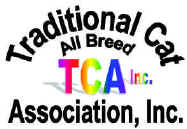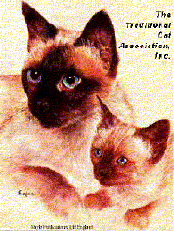
 The
Traditional Cat Association,
Inc.©1987®TM
Official Website
The
Traditional Cat Association,
Inc.©1987®TM
Official Website
Founded 1987, by Diana L.
Fineran
|
" Home of the Traditional Cat"© |
|
Our Motto: To Preserve,
Protect, Perpetuate, and Promote Traditional Cats.© |
|
|
||||
|
|
HISTORY - PERSONALITY - HEALTH Copyright © ® Diana Fineran, January 2, 2007 HISTORY The founding female was a hairless, Blue Tortie called Varya, found on the Russian streets in 1989. She was mated with domestic shorthairs to develop a breed with many names: Donskoy, Don Sphynx, Don Hairless, Don Bald Cat or Donksy. It is a Russian breed with curly whiskers and tail tip with a soft, dense, close lying slightly curly coat. In winter the whole body may be covered with a fine coat. The first Peterbalds were born in Russian in January, 1994,
the result of breeding a Tortie, Traditional Oriental Shorthair named, Radma Vom
Jagerhof, to a light-boned Oriental looking Donskoy named, Afinogen Myth.
The breeder was Olga S. Mironova. After
two breedings, four Classic Peterbald kittens were produced.
They were Mandarin iz Murino, In 1996 one of Nocturne iz Murino’s daughters, named PERSONALTIY The Classic Peterbald is an elegant and intelligent cat with a sturdy body that contributes to its graceful movement. Extremely loving, affectionate, and loyal they will sit in your warm lap for as long as you allow them to. They enjoy running to great you and seeing what’s up in their home as they follow you about. Being so social they enjoy company. Therefore they usually don’t like being alone. Some are outgoing. Some are more reserved with strangers. Assertive, with a mind of their own, they make fun loving companions for indoor only owners. HEALTH They are usually healthy with no known anomalies. |
|
The Traditional Cat Association, Inc.©1987®TM ALL RIGHTS RESERVED © by John & Diana Fineran - Aug 1999- 2025 No portion of this website or any information contained within it may be copied, or in any way distributed, without the expressed written permission of John or Diana Fineran - No exceptions. |